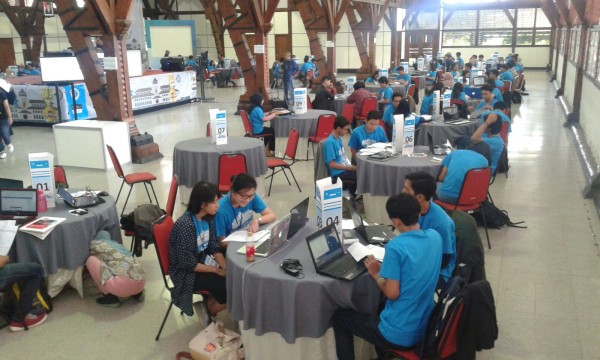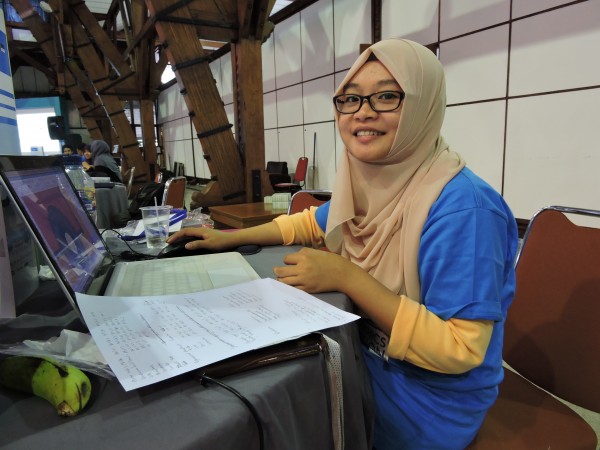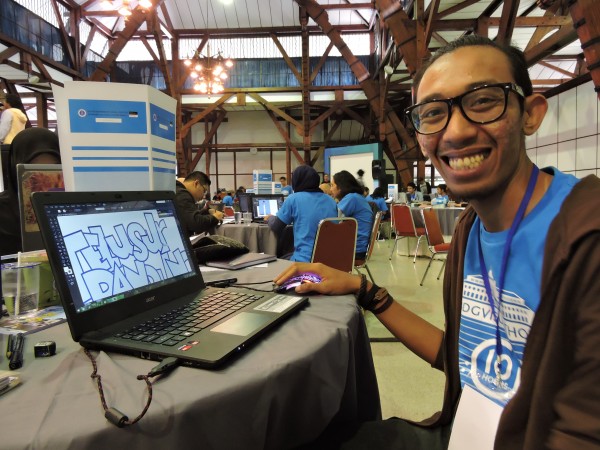As a founding member of the Open Government Partnership, Indonesia has been vocal about embracing the potential of technology to bring information on spending and performance to the public, and to connect government workers with the people they serve.
But the transition to new ways of working with technology is more than just a technical issue for government actors, and for citizens.
Not everyone feels able to access government data that is published online; and there is a huge cultural shift underway in attitudes towards government engagement, with younger people, rural communities and marginalised groups for the first time raising their voices in governance debates.
Below is the first in a series of articles highlighting some of the new voices that are emerging in Indonesia’s quest for open and accountable governance, showing how school children, technology students and women are speaking up about governance issues that affect them.
In December 2015, at the invitation of Bandung City Government, 80 students from the city’s Institute of Technology spent 48 hours taking data from the government’s health, education, tourism and infrastructure departments and competing to create the most engaging public information campaigns.
The 2 day ‘visualthon’ event was one of a series of steps the City of Bandung has been trialling to make government more open to ordinary people - but, more importantly, the event itself highlights a significant shift in the culture of government/citizen engagement, with a new generation of actors taking the lead.
Breaking down the barriers to collaborative working
20 years ago it would have been unthinkable for a city government in Indonesia to reach out to students to ask for help in analysing data and finding ways to communicate government information to the public.
It would also have been daunting for students to work with powerful and previously closed-off government departments.
But at the Bandung visualthon, the student teams were both positive and confident about working collaboratively with government - in fact, they were a lot less interested in how they are setting a new governance agenda, and focused instead on the task at hand.
“If we don’t visualize this information, citizens won’t see it.
Bandung is known as the “city of pigs” as there’s so much pollution - both government and citizens are struggling to keep litter off the streets. There are facilities for trash, but people aren’t using them so I’m creating a new way to present this information and show people how to reduce their daily rubbish.”
- Nanda Nini Anggalih, MA in Design
“Hardly anyone here uses public transport, and many people think this is a small issue. But for me, it’s a major one because we’re all sitting in traffic while the clean air we still have in Bandung is becoming more polluted. If we stop driving private cars, and perhaps even walking more on the street, we’d say hello and feel connected, which would make people happier.”
- Diky Prihtiady, BA in Graphics Design
Is technology supporting a new generation of open governance actors?
Ria Ernusari, who leads the Making All Voices Count programme in Indonesia, reflected on how this group of students - and their government counterparts – are willing to experiment with new ways of working together.
“Everyone in this room was born just before the reformation era. They’re open, and engaged, and they don’t have to constantly look over their shoulder, afraid of punishment for saying the wrong thing… Bandung is a pilot city of the Open Government Indonesia and the team behind the visualthon are willing to test out new ways of engaging citizens in governance issues.”
And the Government of Bandung is not alone in demonstrating a change in attitude and approach.
Last year, at the Global Voices Summit, Making All Voices Count's Hyshyama Hamin talked to Filippino government officials who argued that they too see a generational shift taking place.
"In one of the sessions at the summit, an official from a local provincial council talked about a changing atmosphere within government, noting a big difference between the new and old generation of government officials. He stressed that the younger officials want to be more tech-savvy, but are also looking for new ways to collaborate with citizens where information goes both ways: "There’s a new breed of officials that want to hear new insights and lessons on how to improve service; but they don’t only want citizens to tell them their problems, they want to hear their solutions too."
Quality, quantity and continuing to question
As the final designs from the Bandung visulathon are rolled out to the public, we do still need to make sure we're looking critically at these new ways of working. How can we work with this new generation of tech-savvy government actors, keen to open up their data for the public? At the same time, how can we make sure that that we're not equating the quantity of data shared with the impact? How can we support government teams in leading their colleagues to be more open, while still maintaining a critical understand of what data is (and isn't) being shared?
A new generation of public officials may embrace technology and the concept of open data, but it will be up to Indonesia's new generation of students, civil society activists, the media and the public to make sure that sharing data actually leads to less corruption, improved public services, and improved governance.
See the latest blog in this series looking at changing education in Semarang Region (one toilet at a time), and explore other projects Making All Voices Count is supporting in Indonesia here.


